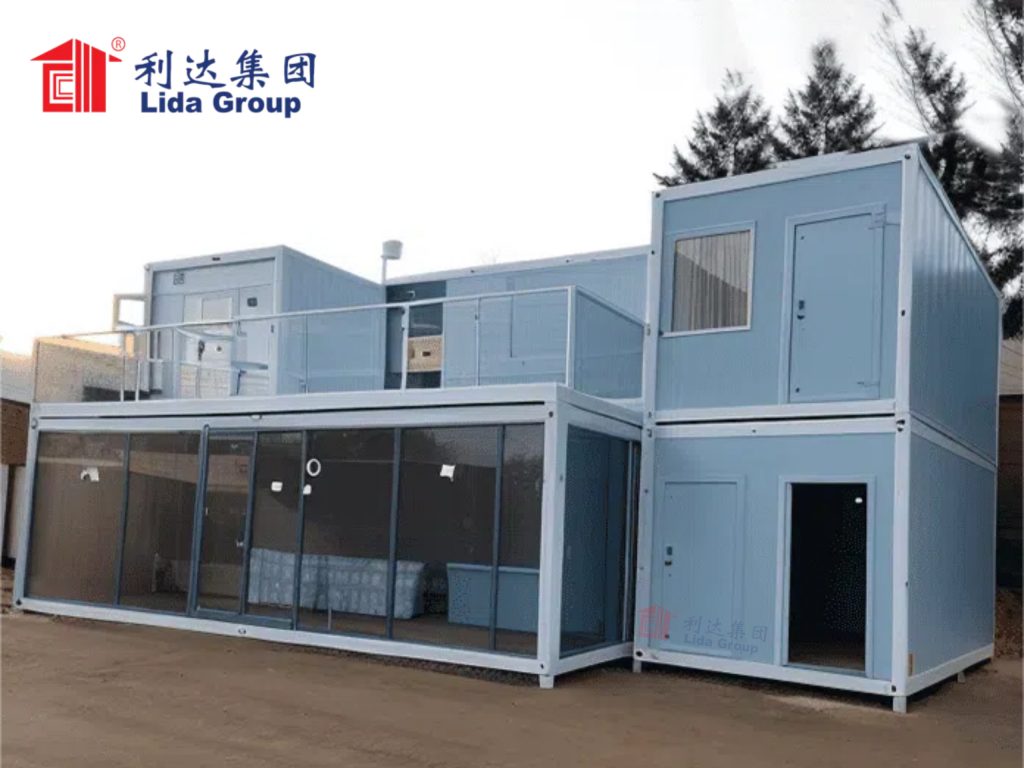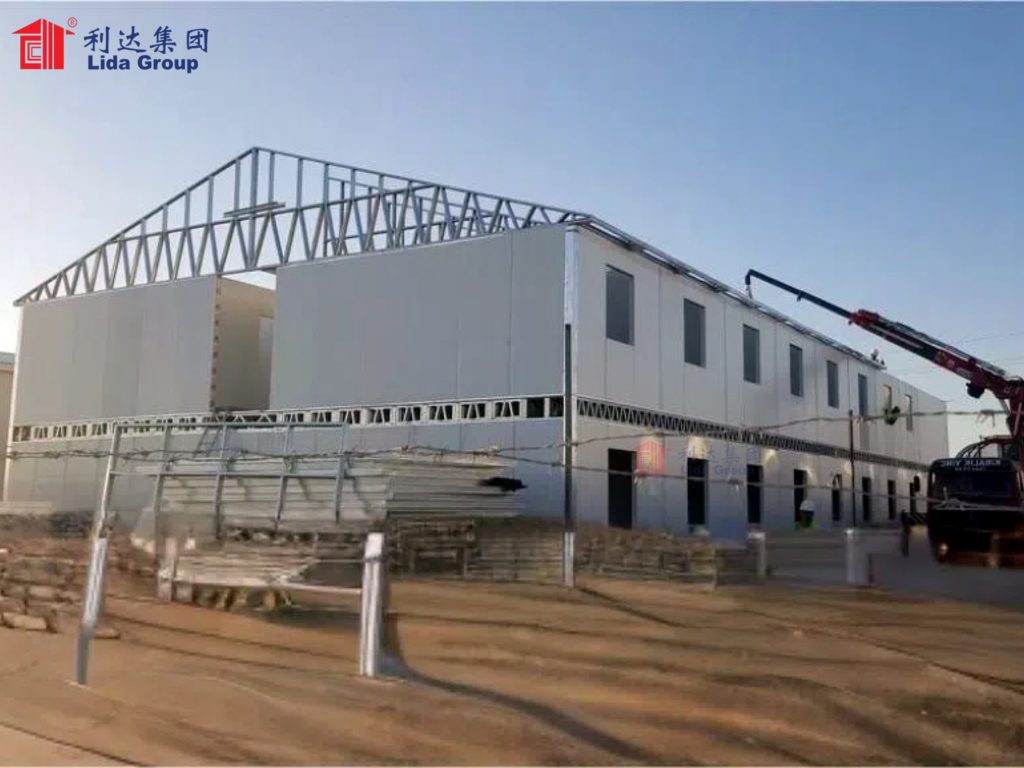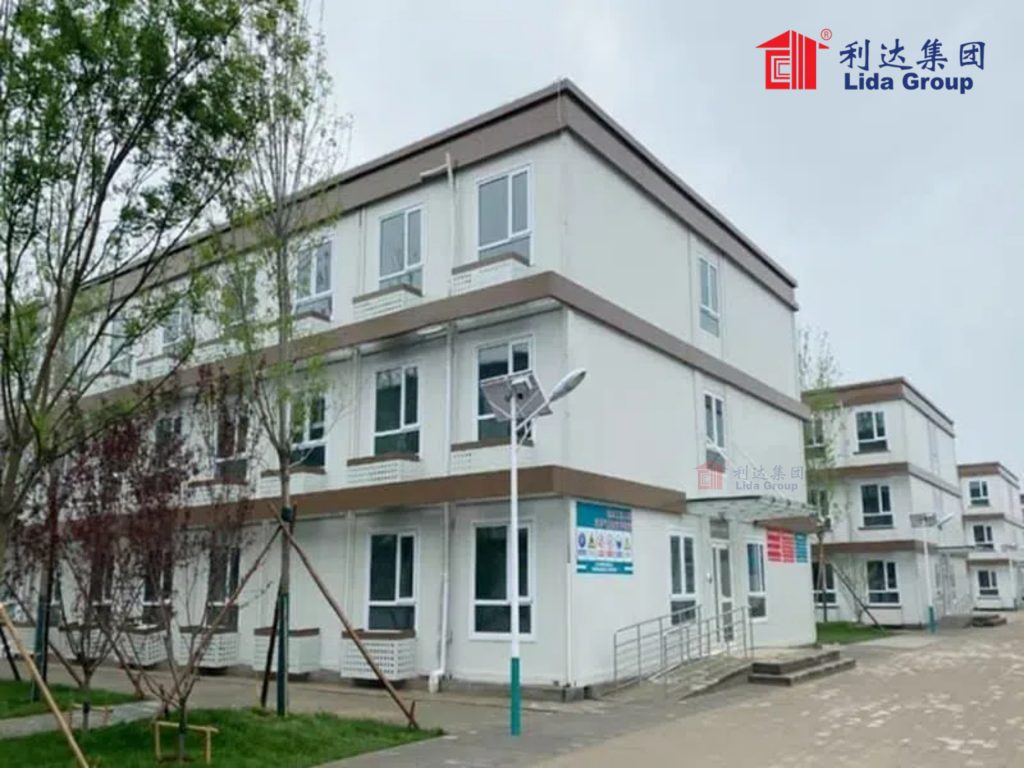For some inhabiting remote off-grid properties, living fully detached from civilization brings independence but also logistical challenges when relocating dwellings between seasonal sites. Harvesting families, wilderness retreat operators, and digital nomads migrating between rural landscapes frequently take down temporary structures to shift between lands according to weather patterns or work cycles. However, manual demounting and rebuilding processes can waste precious time better spent thriving self-sufficiently in nature. Seeking hassle-free repositioning of shelter, some off-grid dwellers have turned to prefabricated housing solutions on movable chassis.
Lida Group, a Shandong-based social enterprise known for manufacturing portable prefab dwellings constructed within standard shipping containers, received an unusual custom commission. Several North American clients living seasonal lifestyles unplugged from cities requested production of fully insulated container cabins mounted atop rugged wheeled undercarriages. The specification was for durable shelters that could be driven between remote wilderness properties without dismantling or reconstruction. Inspired by the prospect of facilitating untethered living through mobile miniature homes, Lida engineers undertook an innovative new product design.

Underdevelopment began with structural analysis of standard 20-foot and 40-foot shipping container dimensions and load-bearing capacities. Computational modeling software simulated stresses that cabins weighing several tons could experience when rolling over rough trackless terrain at low speeds. Internal bracing, flooring reinforcements and adhesion methods between container bodies and rolling platforms required extensive testing and prototyping to withstand shocks and ensure safe transit between seasonal sites miles apart.
With structural integrity assured, focus shifted to adapting container interiors into liveable micro-cabins. Spacious lofts were cantilevered over wheeled undercarriages using adjustable telescopic beams allowing full standing room. Exterior access points including pull-down stairs, storage compartments and utility sheds received rugged weatherproofing. Heavily insulated prefabricated wall panels assembled quickly with mechanical fastening systems for maximum insulation. Durable thermoplastic sheet flooring underlay carpet or hardwood options.

Integrated off-grid systems optimized independence between properties without utility infrastructure. Solar arrays retracted for travel while diesel generators produced backup electricity. Independent water supplies onboard included gravity-fed cisterns catching roof runoff and portable tanks for hauling between sites. Composting toilets completed basic amenities. For comforts of home despite tiny footprints, full kitchenettes and bunk arrangements prioritized efficient storage furnishing lightweight homes to roam.
Field testing began on private land plots in remote areas of northern USA and Canada. After shipping empty cabins by truck for initial on-site builds, Lida engineers helped customers commission their movable micro-shelters. Impressively, inhabited units weighing many tons proved remarkably nimble hauling personal possessions between seasonal stakes with available 4×4 vehicles. Even meticulous off-grid families accustomed to primitive wilderness living found the move-in process effortless compared to physically relocating demounted shelters manually.

Months of habitation revealed fully sealed insulated container construction maintained comfortable temperatures year-round, buffering extremes through all seasons. Sturdy wheels, suspension and bracing configurations proved their validity as cabins confidently rolled single-file down rough logging paths only wide enough for a single truck. Minimal rolling resistance increased fuel efficiency hauling units between properties over uneven bush trails at steady walking pace, safely transporting dwellings and cargo in a single consolidated load without disassembly or delay.
Today, these off-grid innovators thrive dotted across private lands between Quebec, Maine and Montana, living freely roaming their mobile micro-cabins. Spending winters chopping firewood or pursuing snowbound hobbies in the shadow of mountain chains, come springtime they simply fire up engines and drive sheltered between blooming meadows guided only by migratory herds. Summertime finds them parked near rushing streams outside vast forests, immersed in nature without cords tethering to society. With harvest seasons, the process repeats seamlessly as cabins smoothly roll with changing landscapes to forever live fully detached yet comfortably housed.

Client feedback emphasizes relief at never again dismantling constructed shelters when seasons shift positions on the land they roam. No cumbersome demounting and reconstruction wastes effort better focused on thriving off civil infrastructure in wilderness they hold dear. Several now commission additional movable micro-cabins to house travelling families spanning generations, facilitating multigenerational nomadic existences through one consolidated transition. For others, the mobile concept inspires visions of tiny homes on wheels opening avenues to inhabit areas normally inaccessible due to drastic seasonal transformation.
As automated manufacturing and modular construction progresses, product refinement continues adapting designs for various topographies. Already multiple startup glamping resort operators inquire about park models drivable between curated remote campsites for low-impact tourism. Digital workers untethered from conventional jobs also envision mobilizing micro- shelters between worldwide co-living communities. Ultimately, containerized transportable dwellings rolling between seasonal addresses untether inhabitants from one fixed spot, liberating humanity to follow nature’s rhythms through all landscapes without impediments. For some, tiny homes on wheels may truly be the ultimate expression of free and sustainable living through all terrains.
In conclusion, prefabricated micro-cabins constructed within standardized shipping containers then equipped with sturdy rolling platforms have opened novel possibilities for seasonal and off-grid populations to freely relocate shelter between rural properties without delay or manual labor. Initial prototypes commissioned by wilderness dwelling clients proved the concept viable for driving fully inhabited tiny homes short distances over land at walking pace, safely mobilizing fully functional housing and possessions between seasonal stakes as environments shift throughout the year. With increasing demand for hassle-free relocation of prefab dwellings observed from various nomadic clienteles, modular transportation-oriented housing continues innovating avenues for humanity to live freely tethered only to nature’s rhythms not stationary infrastructure grids.

Related news
-
Aid organization tests Lida Group's portable prefab container housing prototypes quickly assembled without foundations to rapidly shelter displaced populations.
2024-10-15 14:30:48
-
Prefab House Assembly Detachable Container Construction Site Color Steel Two-Story Dormitory Customization
2024-10-11 11:19:30
-
Lida Group designs modular steel framed units for fast track construction of prefab student housing using structural insulated composite sandwich wall panels.
2024-09-26 16:24:50
contact us
- Tel: +86-532-88966982
- Whatsapp: +86-13793209022
- E-mail: sales@lidajituan.com


